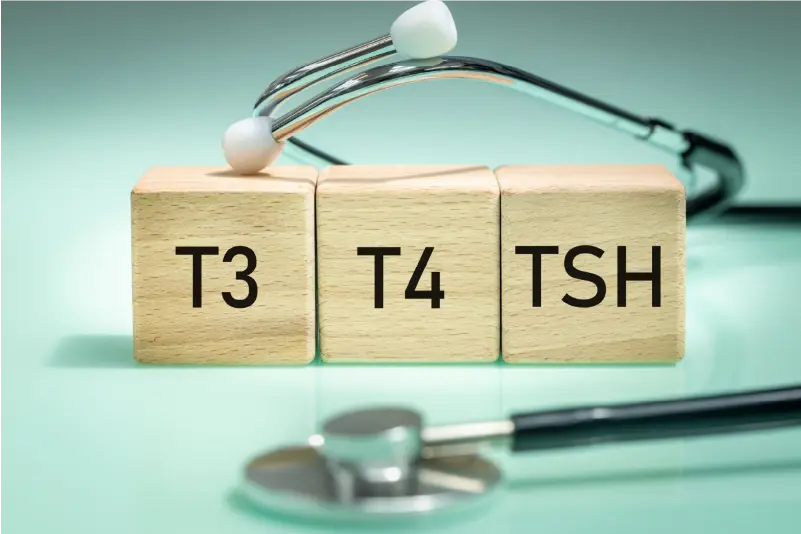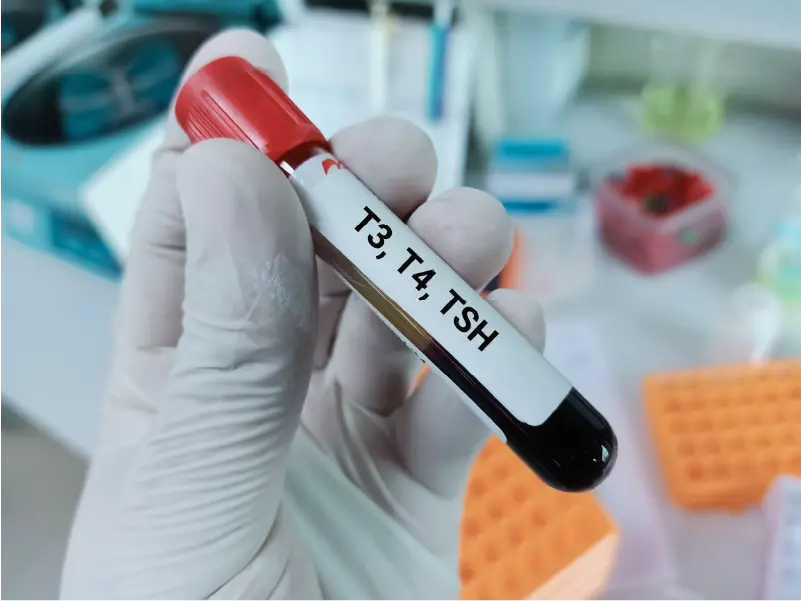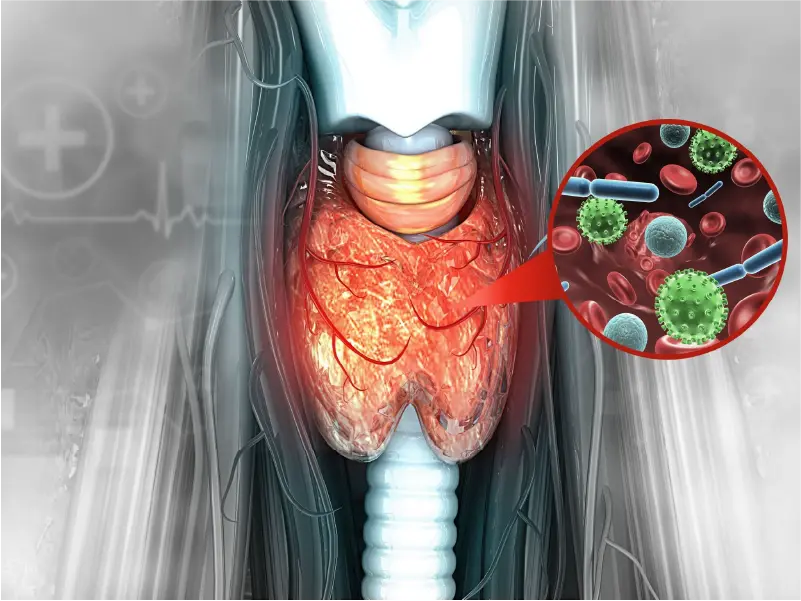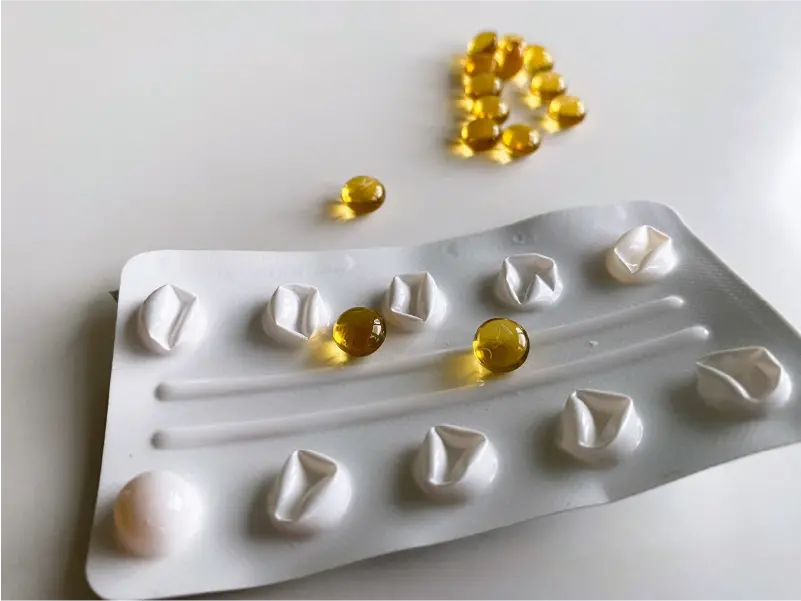Table of Contents Show
T3, also known as triiodothyronine, is a thyroid hormone that regulates your metabolism, energy, and body temperature. It is produced by your thyroid gland, a butterfly-shaped organ located at the base of your neck. T3 is one of the most important hormones for weight loss, as it helps you burn calories and fat more efficiently.
However, some people may have low levels of T3 due to various reasons, such as hypothyroidism, stress, aging, dieting, or medication. Low T3 can cause symptoms such as fatigue, cold intolerance, depression, hair loss, dry skin, and weight gain. If you are struggling to lose weight despite eating healthy and exercising regularly, you may have low T3 levels.
Fortunately, there are ways to increase your T3 levels and boost your weight loss efforts. In this article, we will explain how to use T3 for weight loss safely and effectively. We will also answer some frequently asked questions about T3 and weight loss. Here are the main points we will cover:
- How T3 affects your metabolism and weight
- How to test your T3 levels and diagnose low T3
- How to use T3 for weight loss Supplements
- How to optimize your diet and lifestyle for T3 production
- How to avoid the side effects and risks of using t3 for weight loss
By the end of this article, you will have a clear understanding of how to use T3 for weight loss and achieve your fitness goals. Let’s get started!
How T3 Affects Your Metabolism and Weight


T3 is the active form of thyroid hormone that influences every cell in your body. It works by binding to receptors on the mitochondria, the energy-producing organelles in your cells. By doing so, it increases the rate of oxygen consumption and heat production in your cells, which is also known as your basal metabolic rate (BMR).
Your BMR is the amount of calories you burn at rest, without any physical activity. It accounts for about 60% of your total daily energy expenditure (TDEE), which is the total amount of calories you burn in a day. The higher your BMR, the more calories you burn and the easier it is to lose weight.
T3 also affects other aspects of your metabolism, such as:
- Glucose metabolism:
T3 stimulates the breakdown of glucose (sugar) in your blood and its uptake by your cells for energy. It also enhances insulin sensitivity, which means your cells respond better to insulin and lower your blood sugar levels. - Lipid metabolism:
T3 stimulates the breakdown of lipids (fats) in your blood and tissues and their oxidation (burning) for energy. It also inhibits the synthesis (production) of new lipids from carbohydrates or proteins. - Protein metabolism:
T3 stimulates the synthesis of new proteins in your muscles and other tissues. It also increases the breakdown of old proteins for energy or recycling.
As you can see, T3 plays a vital role in regulating your metabolism and weight. By increasing your energy expenditure and enhancing your glucose, lipid, and protein metabolism, it helps you burn more calories and fat and build more muscle mass.
However, if you have low levels of T3, the opposite happens. Your metabolism slows down, you burn fewer calories and fat, and you lose muscle mass. This can lead to weight gain or difficulty losing weight.
How to Test Your T3 Levels and Diagnose Low T3


If you suspect that you have low levels of T3, you should consult with your doctor and get a blood test. A blood test can measure the levels of different thyroid hormones in your blood, such as:
- Total T4: The total amount of thyroxine (T4), the inactive form of thyroid hormone that is converted into T3 in your tissues.
- Free T4: The amount of unbound or free T4 that is available for conversion into T3.
- Total T3: The total amount of triiodothyronine (T3), the active form of thyroid hormone that regulates your metabolism.
- Free T3: The amount of unbound or free T3 that is available for binding to receptors on your cells.
- Reverse T3: A metabolite of T4 that blocks the conversion of T4 into T3 and inhibits the action of T3 on your cells.
- Thyroid-stimulating hormone (TSH): A hormone produced by your pituitary gland that stimulates your thyroid gland to produce more or less thyroid hormones.
The normal ranges for these hormones may vary depending on the laboratory and the method used. However, a general guideline is:
- Total T4: 4.5 to 12.5 mcg/dL
- Free T4: 0.8 to 1.8 ng/dL
- Total T3: 80 to 200 ng/dL
- Free T3: 2.3 to 4.2 pg/mL
- Reverse T3: 10 to 24 ng/dL
- TSH: 0.4 to 4.0 mIU/L
If your T3 levels are below the normal range, you may have low T3 or hypothyroidism. Hypothyroidism is a condition where your thyroid gland does not produce enough thyroid hormones. It can be caused by various factors, such as:
- Autoimmune disease:
A condition where your immune system attacks your thyroid gland and damages its cells. The most common type is Hashimoto’s thyroiditis, which affects about 5% of the population. - Iodine deficiency:
A condition where you do not get enough iodine from your diet or supplements. Iodine is an essential mineral that your thyroid gland needs to produce thyroid hormones. - Medication:
Some drugs can interfere with the production or conversion of thyroid hormones, such as lithium, amiodarone, or antithyroid drugs. - Surgery:
If you have had a partial or total removal of your thyroid gland (thyroidectomy) due to cancer or other reasons, you may need to take thyroid hormone replacement therapy for life. - Radiation:
If you have had radiation therapy to your neck or head for cancer or other reasons, you may damage your thyroid gland and reduce its function.
If your T3 levels are within the normal range but you still have symptoms of low T3, you may have low T3 syndrome. Low T3 syndrome is a condition where your body does not convert enough T4 into T3 or produces too much reverse T3. It can be caused by various factors, such as:
- Stress:
Chronic stress can activate your adrenal glands to produce more cortisol, a hormone that inhibits the conversion of T4 into T3 and increases the production of reverse T3. - Inflammation:
Chronic inflammation can trigger the release of cytokines, molecules that modulate your immune system and also inhibit the conversion of T4 into T3 and increase the production of reverse T3. - Illness:
Acute or chronic illness can affect your liver, kidneys, or other organs that are involved in the conversion of T4 into T3 and increase the production of reverse T3. - Dieting:
Severe calorie restriction or fasting can lower your insulin levels and activate your sympathetic nervous system, both of which inhibit the conversion of T4 into T3 and increase the production of reverse T3.
The symptoms of low t3 thyroid weight loss may include:


- Weight gain or difficulty losing weight
- Fatigue or low energy
- Cold intolerance or feeling cold all the time
- Dry skin, hair, or nails
- Hair loss or thinning hair
- Constipation or slow digestion
- Depression or low mood
- Brain fog or poor memory
- Low libido or sexual dysfunction
- Irregular periods or infertility
If you have any of these symptoms and suspect that you have low T3 levels, you should consult with your doctor and get a blood test. Your doctor can diagnose your condition and prescribe the appropriate treatment for you.
How to Use T3 Weight Loss in supplements form


One of the treatments for low T3 or hypothyroidism is to take synthetic thyroid hormones, such as levothyroxine (T4) or liothyronine (T3). These medications can replace the missing thyroid hormones in your body and restore your normal metabolism and weight.
However, some people may not respond well to levothyroxine (T4) alone, as they may have problems converting it into active T3 in their tissues. They may still have symptoms of low T3 despite having normal blood levels of T4 and TSH. These people may benefit from taking liothyronine (T3) in addition to levothyroxine (T4), as this can provide them with more active thyroid hormone and improve their symptoms.
Liothyronine (T3) is also sometimes used by people who do not have low T3 or hypothyroidism but want to lose weight faster. They may take liothyronine (T3) alone or in combination with levothyroxine (T4) to boost their metabolism and burn more calories and fat.
However, using liothyronine (T3) for weight loss is not recommended without medical supervision, as it can have serious side effects and risks. Some of these include:
- Heart problems:
Taking too much liothyronine (T3) can cause tachycardia (fast heart rate), arrhythmia (irregular heart rhythm), palpitations (heart fluttering), angina (chest pain), hypertension (high blood pressure), and even cardiac arrest (heart attack). - Bone problems:
Taking too much liothyronine (T3) can cause osteoporosis (bone loss), fractures (bone breaks), and osteomalacia (softening of bones). - Muscle problems:
Taking too much liothyronine (T3) can cause muscle wasting (loss of muscle mass and strength), weakness, cramps, and tremors.
- Psychological problems:
Taking too much liothyronine (T3) can cause anxiety, nervousness, irritability, insomnia, mood swings, and psychosis. - Thyroid problems:
Taking too much liothyronine (T3) can suppress your natural thyroid function and cause hypothyroidism (low thyroid hormone levels) when you stop taking it. It can also cause thyroid storm, a life-threatening condition where your thyroid hormones become extremely high and cause a severe hypermetabolic state.
Therefore, if you want to use liothyronine (T3) for weight loss, you should only do so under the guidance of your doctor. Your doctor can prescribe the right dose and monitor your blood levels and symptoms regularly. You should also follow a healthy diet and exercise program to support your weight loss efforts.
How to Optimize Your Diet and Lifestyle for T3 Production


Besides taking liothyronine (T3) supplements, there are other ways to increase your T3 levels and boost your weight loss naturally. These include optimizing your diet and lifestyle for T3 production. Here are some tips to follow:
- Eat enough calories:
Eating too few calories can lower your T3 levels and slow down your metabolism. You should eat enough calories to maintain your health and activity level, but not more than you need. A general guideline is to multiply your body weight in pounds by 10 to 15 to get your daily calorie intake. For example, if you weigh 150 pounds, you should eat between 1500 and 2250 calories per day. - Eat enough protein:
Protein is essential for building and maintaining muscle mass, which can increase your metabolism and burn more calories. Protein also provides the amino acids that your thyroid gland needs to produce thyroid hormones. You should eat at least 0.8 grams of protein per kilogram of body weight per day. For example, if you weigh 68 kilograms (150 pounds), you should eat at least 54 grams of protein per day. Some good sources of protein are lean meat, fish, eggs, dairy, soy, nuts, seeds, and legumes. - Eat enough carbs:
Carbs are the main source of glucose for your cells and brain. Glucose is also needed for the conversion of T4 into T3 in your tissues. You should eat enough carbs to fuel your energy needs, but not more than you can use. A general guideline is to get 40% to 60% of your calories from carbs. For example, if you eat 2000 calories per day, you should get 800 to 1200 calories from carbs. Some good sources of carbs are whole grains, fruits, vegetables, beans, and lentils. - Eat enough fat:
Fat is important for the absorption of fat-soluble vitamins and the production of hormones, including thyroid hormones. You should eat enough fat to support your health and hormone balance, but not more than you need. A general guideline is to get 20% to 35% of your calories from fat. For example, if you eat 2000 calories per day, you should get 400 to 700 calories from fat. Some good sources of fat are olive oil, avocado, nuts, seeds, fish oil, and coconut oil. - Eat enough iodine:
Iodine is an essential mineral that your thyroid gland needs to produce thyroid hormones. You should eat enough iodine to prevent iodine deficiency and hypothyroidism. The recommended daily intake of iodine for adults is 150 micrograms per day. Some good sources of iodine are seaweed, seafood, dairy products, eggs, iodized salt, and iodine supplements. - Eat enough selenium:
Selenium is another essential mineral that helps your thyroid gland produce thyroid hormones and protects it from oxidative stress. You should eat enough selenium to prevent selenium deficiency and hypothyroidism. The recommended daily intake of selenium for adults is 55 micrograms per day. Some good sources of selenium are Brazil nuts, tuna, salmon, chicken, eggs, mushrooms, and sunflower seeds. - Avoid goitrogens:
Goitrogens are substances that can interfere with the production or action of thyroid hormones. They can be found in some foods or medications. You should avoid or limit goitrogens if you have low T3 levels or hypothyroidism. Some common goitrogens are:
- Cruciferous vegetables:
These include broccoli, cauliflower, cabbage, kale, Brussels sprouts, and turnips. These vegetables contain glucosinolates, compounds that can inhibit the uptake of iodine by your thyroid gland and reduce the production of thyroid hormones. However, you can still eat these vegetables in moderation, as they have many health benefits. You can also reduce their goitrogenic effect by cooking them or eating them with iodine-rich foods.- Soy products: These include tofu, tempeh, soy milk, soy sauce, and soybean oil. These products contain isoflavones, compounds that can act as weak estrogen and interfere with the feedback loop between your pituitary gland and your thyroid gland. This can lower your TSH levels and reduce the stimulation of your thyroid gland to produce thyroid hormones. However, you can still eat these products in moderation, as they have many health benefits. You can also reduce their goitrogenic effect by eating them with iodine-rich foods or taking selenium supplements.
- Certain medications: These include lithium, amiodarone, antithyroid drugs, and some antidepressants. These drugs can affect the production or conversion of thyroid hormones in various ways. You should consult with your doctor before taking any of these medications if you have low T3 levels or hypothyroidism. You should also monitor your blood levels and symptoms regularly and adjust your dosage accordingly.
- Exercise regularly:
Exercise is one of the best ways to boost your metabolism and burn more calories and fat. Exercise also stimulates the production and release of thyroid hormones and improves your insulin sensitivity and glucose metabolism. You should aim for at least 150 minutes of moderate-intensity aerobic exercise or 75 minutes of vigorous-intensity aerobic exercise per week. You should also include some strength training exercises to build and maintain your muscle mass. Some examples of aerobic exercises are walking, jogging, cycling, swimming, and dancing. Some examples of strength training exercises are lifting weights, doing push-ups, squats, lunges, and planks. - Manage your stress:
Stress is one of the main causes of low T3 syndrome, as it can lower your T3 levels and increase your reverse T3 levels. Stress can also trigger emotional eating and cravings for unhealthy foods that can sabotage your weight loss efforts. You should try to reduce your stress levels by practicing relaxation techniques such as deep breathing, meditation, yoga, tai chi, or massage. You should also avoid or limit caffeine, alcohol, nicotine, and other stimulants that can increase your stress hormones and worsen your symptoms. - Get enough sleep:
Sleep is essential for your health and weight loss, as it helps you regulate your hormones, repair your tissues, and restore your energy. Sleep also affects your appetite and hunger hormones, such as leptin and ghrelin. Leptin is a hormone that signals your brain that you are full and satisfied. Ghrelin is a hormone that signals your brain that you are hungry and need to eat. When you don’t get enough sleep, your leptin levels decrease and your ghrelin levels increase, which makes you feel hungrier and crave more food. You should aim for at least 7 to 9 hours of quality sleep per night. You should also follow a regular sleep schedule and avoid distractions such as light, noise, or electronics before bed.
By following these tips, you can optimize your diet and lifestyle for T3 production and boost your weight loss naturally.
Can Side Effects and risks of using t3 for weight loss
As we mentioned earlier, using liothyronine (T3) for weight loss is not recommended without medical supervision, as it can have serious side effects and risks. However, if you decide to use liothyronine (T3) for weight loss under the guidance of your doctor, you should be aware of the possible side effects and risks and how to avoid them.
Some of the common side effects of using liothyronine (T3) for weight loss are:
- Headache
- Nausea
- Diarrhea
- Sweating
- Heat intolerance
- Nervousness
- Insomnia
- Tremors
- Palpitations
These side effects are usually mild and temporary and can be reduced by starting with a low dose and gradually increasing it until you reach the optimal dose for you. You should also monitor your blood levels and symptoms regularly and adjust your dose accordingly.
Some of the serious risks of using t3 for weight loss are:
- Heart problems:
As we mentioned earlier, taking too much liothyronine (T3) can cause tachycardia (fast heart rate), arrhythmia (irregular heart rhythm), palpitations (heart fluttering), angina (chest pain), hypertension (high blood pressure), and even cardiac arrest (heart attack). These risks are higher if you have a pre-existing heart condition or if you take other medications that affect your heart, such as beta-blockers, calcium channel blockers, or anticoagulants. You should avoid using liothyronine (T3) for weight loss if you have a heart condition or if you take any of these medications. You should also consult with your doctor before using liothyronine (T3) for weight loss if you have a family history of heart disease or if you have any risk factors such as high cholesterol, diabetes, obesity, or smoking. You should also monitor your heart rate and blood pressure regularly and seek medical attention immediately if you experience any signs of heart problems. - Bone problems:
As we mentioned earlier, taking too much liothyronine (T3) can cause osteoporosis (bone loss), fractures (bone breaks), and osteomalacia (softening of bones). These risks are higher if you are older, female, menopausal, or have a low calcium intake or vitamin D deficiency. You should avoid using liothyronine (T3) for weight loss if you have osteoporosis or a history of fractures. You should also consult with your doctor before using liothyronine (T3) for weight loss if you have any risk factors such as low bone density, low calcium intake, vitamin D deficiency, or use of corticosteroids or anticonvulsants. You should also monitor your bone density and calcium levels regularly and take calcium and vitamin D supplements as recommended by your doctor. - Muscle problems:
As we mentioned earlier, taking too much liothyronine (T3) can cause muscle wasting (loss of muscle mass and strength), weakness, cramps, and tremors. These risks are higher if you have a pre-existing muscle condition or if you take other medications that affect your muscles, such as statins, fibrates, or antipsychotics. You should avoid using liothyronine (T3) for weight loss if you have a muscle condition or if you take any of these medications. You should also consult with your doctor before using liothyronine (T3) for weight loss if you have any risk factors such as low protein intake, dehydration, electrolyte imbalance, or use of diuretics or laxatives. You should also monitor your muscle mass and strength regularly and do some strength training exercises to prevent muscle loss. - Psychological problems:
As we mentioned earlier, taking too much liothyronine (T3) can cause anxiety, nervousness, irritability, insomnia, mood swings, and psychosis. These risks are higher if you have a pre-existing psychological condition or if you take other medications that affect your mood, such as antidepressants, mood stabilizers, or stimulants. You should avoid using liothyronine (T3) for weight loss if you have a psychological condition or if you take any of these medications. You should also consult with your doctor before using liothyronine (T3) for weight loss if you have any risk factors such as stress, trauma, substance abuse, or family history of mental illness. You should also monitor your mood and behavior regularly and seek psychological help if you experience any signs of psychological problems. - Thyroid problems:
As we mentioned earlier, taking too much liothyronine (T3) can suppress your natural thyroid function and cause hypothyroidism (low thyroid hormone levels) when you stop taking it. It can also cause thyroid storm, a life-threatening condition where your thyroid hormones become extremely high and cause a severe hypermetabolic state. These risks are higher if you have a pre-existing thyroid condition or if you take other medications that affect your thyroid, such as iodine supplements, thyroid hormone replacement therapy, or antithyroid drugs. You should avoid using liothyronine (T3) for weight loss if you have a thyroid condition or if you take any of these medications. You should also consult with your doctor before using liothyronine (T3) for weight loss if you have any risk factors such as autoimmune disease, iodine deficiency or excess, radiation exposure, or surgery on your thyroid gland. You should also monitor your thyroid levels and symptoms regularly and follow your doctor’s instructions on how to stop taking liothyronine (T3) safely.
By following these precautions, you can avoid the side effects and risks of using liothyronine (T3) for weight loss.
Conclusion about How to Use T3 for Weight Loss
In conclusion about How to Use T3 for Weight Loss, T3 is a thyroid hormone that regulates your metabolism and weight. Low T3 levels can cause weight gain or difficulty losing weight. You can increase your T3 levels by taking liothyronine (T3) supplements under the guidance of your doctor or by optimizing your diet and lifestyle for T3 production. However, using liothyronine (T3) for weight loss is not recommended without medical supervision, as it can have serious side effects and risks. You should be aware of the possible side effects and risks and how to avoid them. You should also follow a healthy diet and exercise program to support your weight loss efforts.




